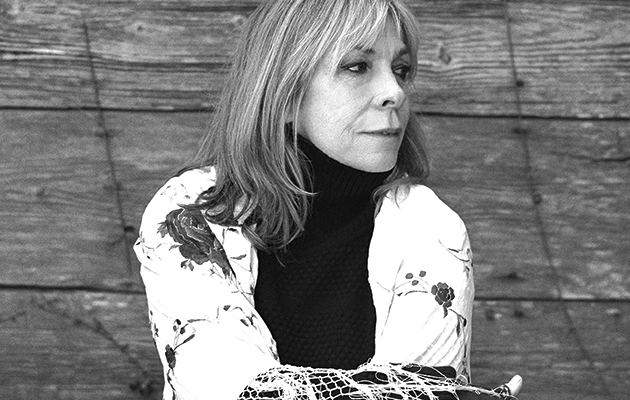When Uncut last caught up with Rickie Lee Jones in 2012, she cheerfully admitted to suffering from writer’s block. “That’s why I keep recording albums of cover versions!” she breezily announced, seemingly unbothered by not having written any new material since 2003’s The Evening Of My Best Day, and gamely plugging The Devil You Know, her second covers collection of the millennium. Since then, she’s moved to New Orleans and kicking back in the Big Easy has set the creative juices flowing again. She now lives on the street made famous by Tennessee Williams’ A Streetcar Named Desire – an address celebrated in the title of her first LP of new songs in a dozen years.
The scuffed up honesty and humanity of post-Katrina New Orleans (she calls it “a city of people who do not try to escape the gravity”) has also permeated the songs. “Singing is acting,” she told Uncut three years ago. But on the 11 new compositions here there is no sense that she is playing a part; the ‘beret and badass bravado’ have gone and she’s singing from the heart. “New Orleans has washed out any affectation,” she blogged while recording the album. “It’s streaming through my own filters, I am not dressing it ‘in the style of’; there is no pretence here in the Crescent City.”
Working on a limited, crowd-funded budget in what Jones calls “an outrageously optimistic amount of time to create a record” represents another break with the past for an artist who was notorious for taking months in the studio (she spent $250,000 recording 1981’s Pirates, an eye-watering sum at the time, even if not quite in the league of Fleetwood Mac’s Tusk).
Jones has always been something of an auteur, but for the first time in her career, confesses to feeling she was “not in charge” during the recording of The Other Side Of Desire, trusting producers John Porter (Roxy Music) and Daniel Lanois’ longtime amanuensis Mark Howard to mould and shape a compelling set of ripe and mature songs into an arrestingly ambitious musical journey, rich in sonic adventure and detail. The opener “Jimmy Choos” is a classic Jones narrative about an expensively dressed woman sitting on a rooftop and throwing bottles at the cops below. “You don’t have to tell me about giving up… someone loves you tonight,” she sings with palpable warmth and compassion over a simmering rhythm that calls to mind another great revenant New Orleans album, Dylan’s Oh Mercy.
The country two-step shuffle “Valtz De Mon Père” could have fitted on Emmylou Harris’ Wrecking Ball, another Lanois/Howard landmark production. “J’ai Connais Pas”, a Waits-like tale of low-life set in a bar, taps deep into the city’s musical history, sung over a walking Fats Domino piano riff. “Blinded By The Hunt” is a slinky slice of secular Southern gospel, a sister song, perhaps, to Matthew E White’s “Will You Love Me”, and sung in a voice that evokes Brittany Howard. “Infinity” floats on a Blue Nile-style chimerical gauze as Jones describes a metaphysical dream riding “a wave through space”. “I Wasn’t Here” changes the mood again, Wizard Of Oz cuteness filtered via a Cerys Matthews pop-charm as Jones’ multi-tracked little-girl vocals dance seductively over an exquisite string arrangement. “Christmas In New Orleans” is a Southern answer to “Fairytale Of New York”, with which it shares a melody to an extent that might excite the interest of Shane MacGowan’s lawyers. “Feet On The Ground” is an achingly beautiful minor-key meditation on damage and loss, but leavened by a heavenly Philly-soul chorus. The album ends enigmatically but exquisitely with a half-sung, half-spoken poem, “A Spider In The Circus Of The Falling Star”, Jones’ voice eerily multi-tracked over a haunting sousaphone.It’s not only Jones’ most absorbing album since 1997’s beats-drenched Ghostyhead, but a record that crowns her career, not as an end but as a culmination.
Q+A
Rickie Lee Jones
What got the creative juices flowing again after such a prolonged period of writer’s block? The juices are probably always flowing, they ebb and flow. But I had nothing to write about or didn’t have the impetus. My decision to write again was a process. I can decide I want to write, then I have to search for what my inner voice wants to discuss. I don’t know why I’m not prolific. I guess it’s a process I treasure so much that I deny it to myself.
How has living in New Orleans shaped the songs?
I used New Orleans as the launch pad thematically. I get tired of abstract ideas and talking about myself. I wanted something concrete. I came here and made a new life. There is nowhere like this in the world. To move from Los Angeles to New Orleans at the age of 58 was a pretty big deal for me. Then the move was the catalyst for a better feeling about life, which in turn made room to write.
How do you respond to the description of the songs as ‘ripe’ and ‘mature’ – ‘thank you’ or ‘how dare you’?
I’m gonna pass! It doesn’t really matter, does it? We work with a few more elements and use every moment, every chance we have to speak with one another to make the world a better place and teach ourselves something.
INTERVIEW: NIGEL WILLIAMSON
The History Of Rock – a brand new monthly magazine from the makers of Uncut – goes on sale in the UK on July 9. Click here for more details.
Uncut: the spiritual home of great rock music.


